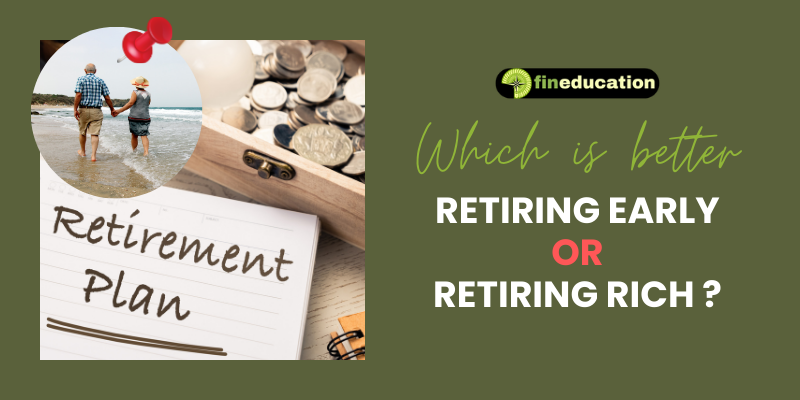Retirement—it’s a word that can bring a sigh of relief or a bit of anxiety, depending on how you envision it. While some dream of retiring as early as possible, others focus on accumulating significant wealth and retiring later but “richer.” Both paths have their unique benefits and challenges, but which is better for you? Should you aim for an early retirement with modest savings, or work longer to retire with a more robust financial cushion?
Let’s break down the Retiring Early vs. Retiring Rich debate, keeping in mind the real-world considerations, challenges, and a few stories that might hit close to home.
The Appeal of Retiring Early
The Dream: Freedom at a Young Age
Imagine this: You’re in your 40s, maybe early 50s, and your alarm clock goes off. But instead of rushing out of bed to get ready for work, you stretch out and sip on your coffee without a care in the world. Why? Because you’re retired.
This is the dream of early retirement—to quit the rat race sooner, enjoy more free time, and live life on your own terms. People who pursue early retirement are often followers of the FIRE movement (Financial Independence, Retire Early), where saving aggressively and living frugally are essential parts of the strategy.
But early retirement doesn’t come without sacrifices.
The Reality: Living on a Lean Budget
Take Jake, for example. At 38, he managed to quit his corporate job by sticking to the FIRE philosophy. But here’s the catch—he now lives on a very tight budget. Sure, he gets to travel and spend time with family, but his budget doesn’t allow for luxury vacations or spur-of-the-moment expenses.
Retiring early means you might have to live more modestly unless your investments or passive income streams are substantial. For some, that’s a trade-off they’re more than willing to make. But for others, having more financial security later on might be worth the wait.
The Case for Retiring Rich
The Dream: Luxury in the Golden Years
Now, let’s flip the scenario. Meet Sarah, who worked until her early 60s. While her friends started retiring in their late 40s, Sarah continued working and investing diligently. She wasn’t necessarily unhappy at work; she enjoyed what she did. By the time she retired, she had a hefty savings account, a diversified investment portfolio, and a few passive income streams.
Sarah’s dream retirement was filled with luxury cruises, vacations to exotic destinations, and the freedom to spend generously on her grandchildren. For her, retiring rich was about having the financial resources to do whatever she wanted without worrying about money.
The Reality: Less Time for Other Passions
But while Sarah has an abundance of wealth, she often wonders if she missed out on the freedom that early retirees enjoy. Many people who aim for retiring rich delay their personal goals or passions in favor of working a few more years to build wealth.
As the saying goes, “time is money.” But for some, the inverse is true: money is time. Working longer gives you more financial security, but it also means delaying the freedom that comes with early retirement.
Comparing Retiring Early vs. Retiring Rich
Now that we’ve looked at two real-world examples, let’s compare the two paths.
| Aspect | Retiring Early | Retiring Rich |
|---|---|---|
| Time Freedom | Maximum freedom in your younger years | Limited freedom until you reach retirement age |
| Financial Security | Lower overall wealth, may require strict budgeting | Greater wealth, allowing for a more luxurious lifestyle |
| Health Benefits | More time to focus on health, fitness, and hobbies | Potential to enjoy wealth, but possibly at an older age |
| Work-Life Balance | Enjoy work-free life early, but possibly with fewer funds | Longer work period but can afford more leisure in later years |
| Mental Satisfaction | Greater sense of freedom earlier, but may feel financially insecure | Financial peace of mind, but may feel like you missed out on free time earlier |
Key Considerations for Both Paths
- Lifestyle Goals: What does your ideal retirement look like? Do you envision yourself traveling, starting a new hobby, or spending more time with loved ones? Understanding what you want out of retirement will help you decide whether to aim for early or rich retirement.
- Financial Situation: Retiring early means you’ll likely have less in your retirement fund, so it’s essential to have a solid budget and a clear understanding of your financial needs. On the other hand, retiring rich requires more work years but gives you the security to live a more relaxed lifestyle later on.
- Health: Your health should play a major role in your decision. Early retirement allows you to enjoy your healthy, active years without being tied to a job. But working longer can help ensure you have the resources to afford top-notch healthcare in your later years.
- Family and Responsibilities: Are you supporting children, parents, or other dependents? Your financial commitments might require you to work longer and retire rich. Alternatively, early retirement might give you the time to focus on family, but you’ll need to be sure your budget can cover all your responsibilities.
How to Decide: Retire Early or Retire Rich?
Let’s circle back to you. Imagine you’re at a crossroads—you’ve been working for a couple of decades and have saved a reasonable amount. You could either retire soon and live a more modest life, or continue working, possibly in a less demanding job, to retire rich later.
Here’s how to make the decision:
1. Assess Your Current Financial Situation
- Calculate your total savings, investments, and any passive income sources you have. Use financial tools or hire a financial advisor to determine if you have enough to live comfortably on for decades.
2. Consider Your Lifestyle Preferences
- Are you okay with frugality, or do you dream of a lifestyle that requires more cash flow? Your spending habits will heavily influence your decision.
3. Check Your Health and Well-being
- Retirement isn’t just about money. It’s about your mental and physical health. If your job is taking a toll, early retirement may be worth considering. Conversely, if you’re still healthy and enjoy working, holding off might be a better choice.
4. Plan for the Unexpected
- Financial experts recommend planning for contingencies like medical emergencies, unexpected family needs, or economic downturns. Make sure you have an emergency fund set aside whether you retire early or rich.
Final Thoughts: The Best of Both Worlds?
The debate of retiring early vs. retiring rich doesn’t have to be all or nothing. Some people manage to retire early and rich by investing wisely, earning through multiple income streams, or running a business that generates passive income.
Take, for instance, Albert, who left his 9-to-5 job at 40 to start his own online business. He’s technically “retired” from the traditional workforce but still earns substantial income through his business. This allows him to enjoy the benefits of early retirement while continuing to grow his wealth.
In the end, the right choice depends on what you value most—time or money. If freedom is your ultimate goal, retiring early might be worth some financial sacrifices. But if security and luxury are what you’re after, you might want to stay the course and retire rich.



